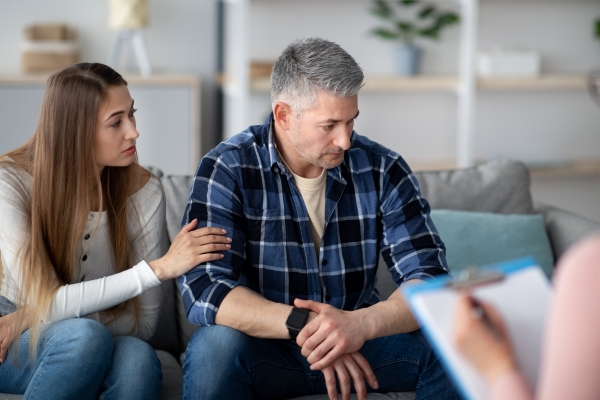Marriage Counseling vs. Therapy
All committed relationships go through periods of challenge and hardship. As the old adage goes, there’s no such thing as “happily ever after” — just happy and committed people who don’t give up when times get tough.
Navigating disagreements, conflicts, stresses from work or family, the impact of trauma or mental health struggles, or simply the monotony of daily life can strain even the most loving relationships.
Partners may experience a disconnect, lack emotional or physical intimacy, or have heated arguments that spiral out of control. These issues left unaddressed can breed resentment, distrust, and distance within the relationship.
The good news is that you don’t have to go it alone. In fact, one of the healthiest relationship habits is recognizing when you need outside support and taking action to get it.
Whether that means talking to trusted friends who will listen without judgement, reading self-help books, or seeking counseling — acknowledging challenges in your partnership and choosing to face them together with courage and commitment is half the battle.
Recognizing When Your Relationship Needs Help
For many couples, the early days and months of a relationship can feel easy, fun, and exhilarating. You’re riding on oxytocin and new relationship energy. But sooner or later, real life sets in. The honeymoon period ends, and you’re faced with each other’s flaws, annoyances, and differences.
This transition can be disillusioning if you expect the giddy infatuation and smoothest of sailing to last forever. But this shift is normal and presents an opportunity to create deeper bonds.
As you navigate this new dynamic, look for signs your relationship might benefit from some external guidance and support:
- You argue frequently or intensely over minor issues
- One or both of you seem quick to anger or irritation
- You struggle to communicate without defensiveness or criticism
- One or both of you withdraws when there’s conflict instead of engaging
- You feel unsure about the future of the relationship
- Intimacy and connection don’t feel as effortless as they once did
- There’s emotional distance between you
While some degree of disagreements and effort in maintaining intimacy are inevitable, ongoing struggles in these areas can erode the health of your partnership if left unaddressed.
Rather than waiting for bigger problems to arise, be proactive in seeking help to strengthen your bond when you notice these early warning signs.

1. Marriage Counseling vs. Couples Therapy: Understanding the Key Differences
If you determine your relationship could use some outside assistance, you’re faced with figuring out what type of help best meets your needs. The two most common options are marriage counseling and couples therapy. But what exactly is the difference between these two modalities?
Focus: Present Problems vs. Past Influences
The primary difference lies in the focus of sessions. Marriage counselors concentrate on addressing current issues and patterns in your relationship and providing practical tools to improve communication, intimacy, and conflict resolution.
The focus rests predominantly on present-day dynamics and forging solutions to move forward.
In contrast, couples therapists explore not just present issues but the roots of these problems, which often trace back to past influences from each partner’s upbringing, previous relationships, attachment styles, unhealed betrayals or hurts, and other historical factors.
By understanding where current struggles originated, couples can heal old wounds that underlie today’s friction and dysfunctional cycles.
Benefits: Building a Stronger Foundation vs. Healing Old Wounds
Due to these differing approaches, the benefits also diverge. Marriage counseling offers the advantage of equipping couples with tangible skills to communicate clearly, argue constructively, deepen intimacy, and resolve differences. You’ll gain vital relationship tools to maintain and fortify your partnership.
Couples therapy yields benefits through a deeper healing process — not just resolving surface-level conflicts but mending core injuries, trauma, and negative patterns that impact the way each partner shows up in relationships.
This healing can integrate fragmented parts of oneself and lay the groundwork for authentic intimacy.

When to Seek Help: Proactive Prevention vs. Addressing Deep-Rooted Issues
Marriage counseling tends to work better earlier in relationships as a preventative measure, before major ruptures have occurred. It can reinforce healthy patterns and provide an emotional “tune up.”
If you don’t have glaring issues but notice your communication fraying around the edges or emotional disconnect emerging, counseling can get you back on track. Premarital counseling equips couples with a strong foundation before committing to marriage.
In contrast, couples therapy helps address more engrained, long-standing challenges fueled by each person’s emotional baggage.
Partners who sustained betrayals or breaches of trust, suffered trauma either individually or as a couple, or display destructive conflict patterns passed down from past generations stand to gain deeper healing through couples therapy.
What to Expect: Communication and Tools vs. Exploring the Root Causes
A marriage counselor’s sessions will focus on cultivating empathy, teaching you conflict resolution and anger management techniques, fostering intimacy through vulnerability and positive interactions, assigning actionable exercises to practice at home, and facilitating productive conversations around disagreements or sore spots. The tone remains solution-focused.
Couples therapy typically fosters a more open-ended, psychologically oriented, reflective space focused on each partner understanding their personal histories, attachment patterns, responses to current tensions, and how to show up more fully in the relationship.
Partners explore the past to illuminate root causes for dysfunctional dynamics. The process involves delving into the inner world of each person and the couple.

2. Marriage Counseling
If what you most need are communication upgrades, conflict de-escalation tactics, renewed physical and emotional intimacy, or confidence ahead of marriage, marriage counseling offers the tools of the trade without deep excavation of past wounds. You’ll gain concrete skills to relate to each other in healthier ways.
Strengthening Communication and Conflict Resolution
Many couples seek counseling when they feel unable to communicate without frequent misunderstandings, criticisms, defensiveness, contempt, or stonewalling, which form Dr. John Gottman’s famous “Four Horsemen” that predict relationship demise.
A counselor can teach you how to express feelings and needs openly, listen and mirror your partner to build empathy during conflicts, de-escalate rising tensions before they explode, and reconcile in gentle ways post-fight.
Applying these evidence-based techniques prevents miniature cracks from causing major breakage.
Reigniting Intimacy and Trust
Over time, the natural ups and downs of careers, family stress, health issues, and coping with losses can result in partners losing emotional and physical connection.
A counselor guides you back into vulnerability with each other through assigning intimate check-ins, prioritizing time together, expressing appreciation, soothing each other’s worries and burdens, and reawakening physical intimacy through sensate focus. Rediscovering playfulness and passion heals the disconnect.
Premarital Counseling: Equipping Yourself for the Journey
Exploring relationship readiness before tying the knot can illuminate potential pitfalls to address before exchanging vows, boost confidence ahead of the big day, and provide you with a game plan for preventing future issues and prioritizing intimacy.
Discussion topics include family backgrounds, communication styles, managing conflict, financial harmony, sexual expectations, shared values, and deal breakers alongside visioning your ideal shared lifestyle.
Is Marriage Counseling Right for You?
If any of the following apply, marriage counseling offers an ideal first step:
- You want to reinforce healthy patterns before contemplating lifelong commitment
- You need to improve everyday communication, conflict resolution, or emotional/physical intimacy
- You’ve experienced minor breaches of trust but overall feel happy and hopeful about the relationship
- You’re lacking relationship role models of positive communication and want guidance
- You don’t require extensive exploration of personal histories or traumas — just better tactics

3. Couples Therapy
While marriage counseling equips you with vital skills to nurture your bond, sometimes past betrayals, attachment injuries, traumatic experiences, or adverse childhood dynamics leave partners emotionally walled off and repeating unhealthy patterns.
Under these circumstances, exploring the root causes fuels deeper healing.
Unpacking Past Hurt and Betrayal
Major breaches of loyalty such as infidelity, dishonesty, or hiding meaningful parts of oneself often require rebuilding shattered trust through understanding what led to deception and owning the betrayal’s traumatic impact.
Couples therapy provides a space for the hurting partner’s pain to be fully heard while the betrayer listens with empathy. Together you identify personal and relationship vulnerabilities that enabled wounding so both people can show up more authentically moving forward.
Understanding the Roots of Current Conflicts
All too often tensions today have their origin in past hurts. One person’s controlling behavior may be linked to an alcoholic parent who extinguished their voice. Another’s emotional reactivity might stem from an insecure attachment pattern established in childhood.
By reflecting together on how your upbringings, previous relationships, attachment styles, family patterns, etc. fuel current friction through maladaptive responses, you can align more closely with your partner’s sensitivities.
Restoring Intimacy and Emotional Connection
Partners stuck in cycles of criticism, defensiveness, contempt, or stonewalling suffer emotional estrangement and physical distance.
Couples therapy helps you interrupt pain-driven patterns by rebuilding positive sentiment, re-engaging without blaming, expressing vulnerable emotions and unmet needs, and relearning each other’s love languages. Sessions cultivate mutual understanding and a teammate mindset so you stand together rather than across a divide. This ushers in renewed affection.

Is Couples Therapy the Answer for Your Relationship?
Consider initiating couples therapy if any of the below resonate:
- You’ve suffered major breaches of trust you want to heal
- Childhood attachment wounds or family patterns encumber intimacy
- You have turbulent fights hinting at deeply rooted issues
- One or both partners feels unable to be vulnerable after past hurts
- You want to understand why conflicts trigger oversized reactions
- The relationship no longer feels satisfying or mutual
4. Investing in Your Relationship
Whether you pursue marriage counseling or couples therapy, choosing a skilled therapist well-versed in relationships who fits your personality and values acts as a crucial first step.
Arriving open and willing to self-reflect while applying tools/insights outside of sessions maximizes positive outcomes.
Finding the Right Therapist
Seek licensed therapists with extensive relationship experience, not generalists. Confirm expertise in Gottman method, EFT (emotionally focused therapy), or Psychobiological Approach if pursuing marriage counseling or knowledge of attachment theory and Betrayal Trauma if opting for couples therapy.
Meet with potential counselors to assess interpersonal rapport and comfort conversing about intimate topics before committing.
Embracing Vulnerability and Commitment
Partners must engage fully by expressing thoughts and emotions transparently, listening without judgment, self-soothing defensiveness, and extending compassion. Set the intention to understand and be understood.
Between sessions actively practice tools given for communication and conflict alongside vulnerability building exercises. Approach the work as a team committed to growth — not looking to place blame or prove who’s right.
Beyond Sessions
Counseling only launches change; lasting transformation requires diligently applying healthy habits once the therapy hour ends. Don’t let slipbacks dishearten you. Healing nonlinear. Expect to struggle feeling competent using new skills.
Stick with it. Long-term commitment to replacing dysfunctional patterns with therapist-given techniques leads to relationship renewal. Eventually new patterns take hold, and you’ll reap rewards.
Conclusion
All intimate relationships undergo periods when external support provides a valuable reboot — whether reinforcing strong communication early on or healing attachment injuries.
If you see your partner and relationship as worthy of investment, counseling or therapy serve as powerful tools. Although challenging at times, embracing the process leads to understanding, intimacy and trust. Ultimately you’re strengthened as individuals and as a couple.

